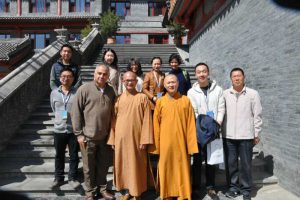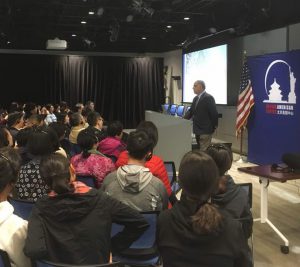
China Speaking Tour on Yale’s Green Dining Policy
 Yale University in New Haven, Connecticut, has demonstrated leadership in “greening” its dining halls. Through a series of progressive dining policies that include significantly increasing the amount of plant-protein served, applying ethical criteria to purchases, and reducing use of meat and other animal-based foods, Yale has not only made its dining halls healthier and more environmentally friendly, but also contributed to changes in the food industry by implementing a sustainable procurement strategy.
Yale University in New Haven, Connecticut, has demonstrated leadership in “greening” its dining halls. Through a series of progressive dining policies that include significantly increasing the amount of plant-protein served, applying ethical criteria to purchases, and reducing use of meat and other animal-based foods, Yale has not only made its dining halls healthier and more environmentally friendly, but also contributed to changes in the food industry by implementing a sustainable procurement strategy.
 Rafi Taherian, Certified Executive Chef ’95, the associate vice president of Yale Hospitality—in charge of all of Yale’s food service—went on a speaking tour of China in 2018. He met with food educators and leaders from universities and other educational institutions in order to introduce Yale’s dining policy, vision, and strategy, and encourage Chinese universities to make commitments to serve “greener food.”
Rafi Taherian, Certified Executive Chef ’95, the associate vice president of Yale Hospitality—in charge of all of Yale’s food service—went on a speaking tour of China in 2018. He met with food educators and leaders from universities and other educational institutions in order to introduce Yale’s dining policy, vision, and strategy, and encourage Chinese universities to make commitments to serve “greener food.”
Brighter Green partnered with our colleagues at the Good Food Fund in China, hosted by China Biodiversity Conservation and Green Development Foundation (CBCGDF), to organize this speaking tour. The aim was to build connections between food leaders from Yale University, Chinese educational institutions, and other food educators, and eventually include other educational institutions in and outside of China in a “peer network.” China has 47 million university students (exceeding the population of many countries), so changes in food purchasing and university menus could result in significant change.
 Taherian arrived in Beijing on March 23, where he was greeted by Brighter Green colleagues, Jian Yi and Miao Jie. There was a welcoming banquet with current and former presidents of the Yale Club of Beijing. The next day Taherian was able to visit the Longquan Buddhist Monastery, which is one of the most influential Buddhist temples in mainland China.
Taherian arrived in Beijing on March 23, where he was greeted by Brighter Green colleagues, Jian Yi and Miao Jie. There was a welcoming banquet with current and former presidents of the Yale Club of Beijing. The next day Taherian was able to visit the Longquan Buddhist Monastery, which is one of the most influential Buddhist temples in mainland China.
 The next two days were filled with various interviews, tours, and events. One event took place at the Yale Center Beijing. Another event took place at the Beijing American Center. These events were well attended and Taherian was able to share his values, visions, and strategies about green dining and sustainable campus food.
The next two days were filled with various interviews, tours, and events. One event took place at the Yale Center Beijing. Another event took place at the Beijing American Center. These events were well attended and Taherian was able to share his values, visions, and strategies about green dining and sustainable campus food.
 On March 27 Taherian was in Hangzhou where he toured Zhejiang University of Agriculture and Forestry, visiting their dining hall and kitchen with their manager of hospitality. Taherian then traveled to Shanghai where he spoke at the Shanghai American Center to food activists and those wanting to learn more about food and sustainability. Taherian was also interviewed by Charlotte Middlehurst, Deputy Editor of China Dialogue, for the article, “The Food Revolution will start on campus.”
On March 27 Taherian was in Hangzhou where he toured Zhejiang University of Agriculture and Forestry, visiting their dining hall and kitchen with their manager of hospitality. Taherian then traveled to Shanghai where he spoke at the Shanghai American Center to food activists and those wanting to learn more about food and sustainability. Taherian was also interviewed by Charlotte Middlehurst, Deputy Editor of China Dialogue, for the article, “The Food Revolution will start on campus.”
 Brighter Green
Brighter Green



